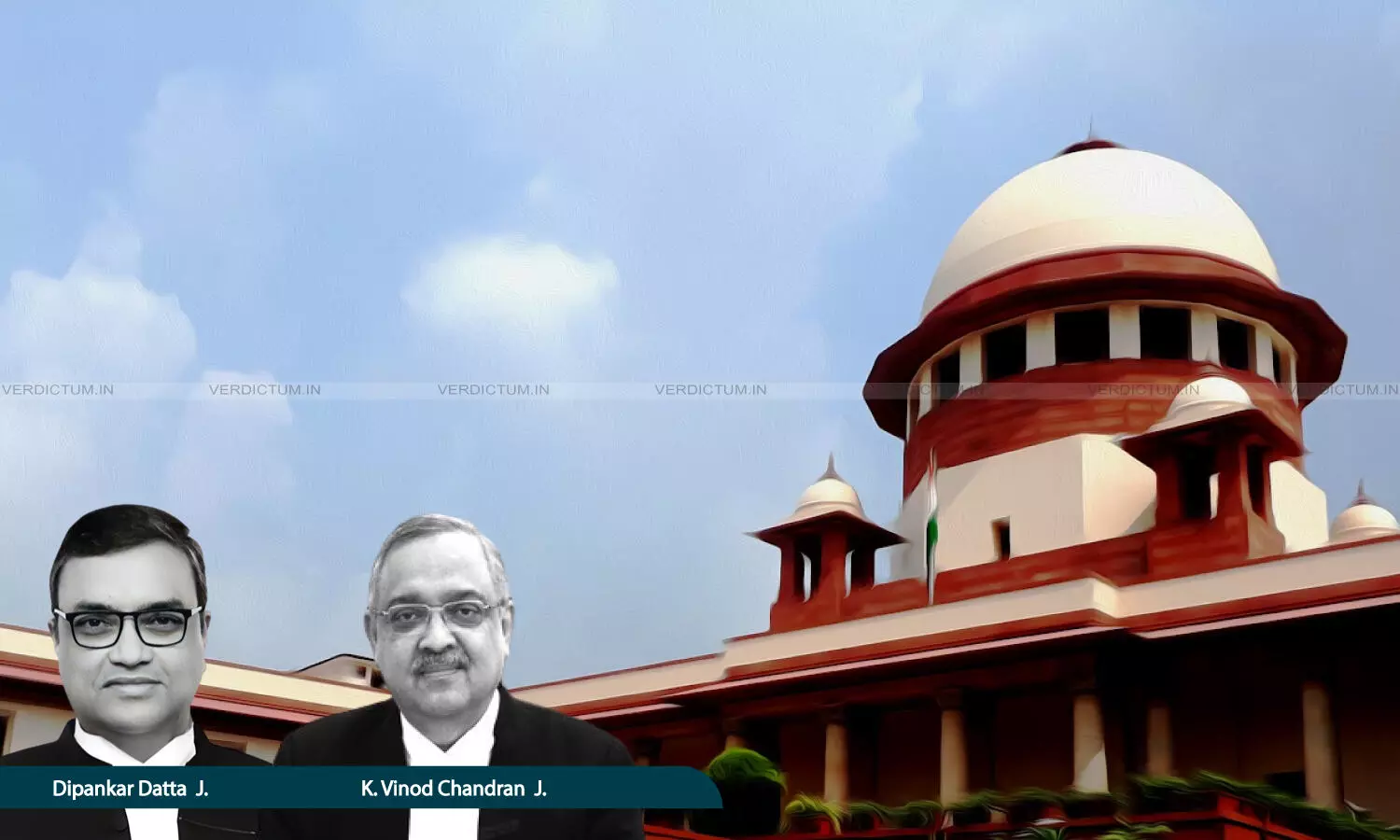
Justice Dipankar Datta, Justice K. Vinod Chandran, Supreme Court
NCLT Has Full Jurisdiction To Decide Whether Gift Deed Is Valid Or Against Companies Act: Supreme Court
 |
|The Supreme Court said that the NCLT/CLB possess a wide jurisdiction to decide all such matters that are incidental and/or integral to the complaint alleging oppression and mismanagement.
The Supreme Court held that the National Company Law Tribunal (NCLT) has full jurisdiction to decide whether the gift deed is valid or not, or whether it is against the provisions of the Companies Act, 1956.
The Court was deciding Civil Appeals filed against the Judgment of the National Company Law Appellate Tribunal (NCLAT), which set aside the NCLT’s Judgment.
The two-Judge Bench of Justice Dipankar Datta and Justice K. Vinod Chandran observed, “In the instant case, it is an admitted fact that the determination of whether the gift deed is valid or not is central to the decision herein and, therefore, the NCLT did have full jurisdiction to decide whether the gift deed is valid or not, or whether it is against the provisions of the 1956 Act and/or internal regulations of the COMPANY, including but not limited to the AoA and the Memorandum of Association.”
The Bench said that the NCLT/CLB (Company Law Board) possess a wide jurisdiction to decide all such matters that are incidental and/or integral to the complaint alleging oppression and mismanagement and such power is subject to any other legislative enactment specifically debarring the NCLT/CLB from exercising its powers in this respect.
Senior Advocate Dhruv Mehta represented the Appellant while Senior Advocates S. Niranjan Reddy and Gopal Sankaranarayanan represented the Respondents.
Facts of the Case
The 1st Respondent was a private limited company which was engaged in trading of paper. At the time of incorporation in 2006, the authorized share capital of the company was Rs. 2 crores divided in to 20,00,000 equity shares of Rs. 10 each. The subscribed and paid-up capital of the company was Rs. 3 lakhs divided into 30,000 equity shares of Rs. 10 each. The Appellant and her husband (2nd Respondent) were the original promoters of the company. The Appellant initially subscribed to 5,000 equity shares, while her husband subscribed to the remaining 25,000 shares. Her husband transferred 24,5000 shares to her, thereby increasing her shareholding and the remaining were transferred to 3rd Respondent.
By the end of financial year, the Appellant held 39,500 shares out of a total of 40,000 equity shares of the issued and paid-up share capital, representing more than 98% of the company’s shareholding. Her husband resigned from the directorship and 3rd Respondent was inducted in his place. The company made a long-term investment and the 5th Respondent was inducted as Additional Director. The Appellant resigned in 2010 and on the day of her resignation, a gift deed was executed through which she purportedly transferred her entire shareholding to 4th Respondent i.e., her mother-in-law out of love and affection. Around 2009-10 the Appellant and her husband drifted apart and police complaints were lodged alleging that she was coerced into signing some blank documents.
In 2011, the husband was re-appointed in the company as director and the same was converted into public limited company. Appellant then lodged another complaint and addressed communications to the Registrar of Companies (ROC) and the Ministry of Corporate Affairs (MCA). She also filed a Petition under the Protection of Women from Domestic Violence Act, 2006 (DV Act). Later, she came to know that her name was removed from the shareholders list and her mother-in-law was shown to have acquired her shareholdings. Hence, she filed another complaint and thereafter, filed a Company Petition before the CLB, which was allowed. The Board Resolutions were set aside and she was declared as lawful owner of shares. The NCLT also found overwriting and manipulation in share transfer form. However, the NCLAT set aside the said decision and being aggrieved, the Appellant approached the Apex Court.
Reasoning
The Supreme Court in the above regard, noted, “… since the alleged induction of the fifth respondent as an Additional Director in the meeting of 15.12.2010 was itself illegal, the fifth respondent could not be deemed to be a validly appointed Director, and his presence in the subsequent meeting dated 17.12.2010 could not have cured the defect of quorum. Thus, both meetings were vitiated for want of proper quorum.”
The Court was of the view that the Board Meetings were invalid on both counts and the resolutions purportedly passed therein, including the acceptance of the Appellant’s alleged resignation, do not warrant validation.
“Collectively taken, all these actions of the COMPANY in serial fashion demonstrate clear oppression and mismanagement in its affairs. Probity is lacking which is prejudicial to the appellant”, it remarked.
The Court, therefore, concluded that interference by the NCLAT with the Judgment and Order of the NCLT, was quite unnecessary.
Accordingly, the Apex Court allowed the Appeals, set aside the NCLAT’s Judgment, and restored that of NCLT.
Cause Title- Shailja Krishna v. Satori Global Limited & Ors. (Neutral Citation: 2025 INSC 1065)
Appearance:
Appellant: Senior Advocate Dhruv Mehta and AOR Ankur Mittal.
Respondents: Senior Advocates S. Niranjan Reddy, Gopal Sankaranarayanan, AORs Ashutosh Jha, Sansriti Pathak, Advocates Ashutosh Gupta, Gaurav Rana, Oleander D Singh, Shivam Tomar, Meha Ashok Agarwal, Shourya Dasgupta, Trisha Chandra, and Aman Prasad.